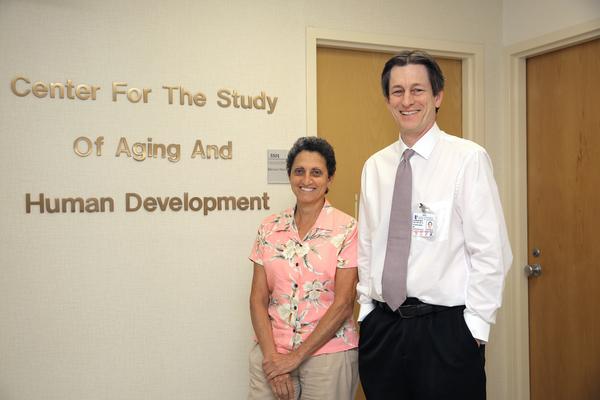
Duke Department of Medicine and School of Medicine investigators, under the leadership of Kenneth Schmader, MD, chief, Division of Geriatrics and professor of medicine, and Miriam Morey, PhD, professor of medicine (Geriatrics), successfully competed for a 5-year renewal of the highly prestigious National Institute on Aging P30, $5.4 million, Claude D. Pepper Older Americans Independence Center (Duke Pepper Center), based in the Duke Center for the Study of Aging and Human Development, previously lead by Harvey Cohen, MD, professor of medicine (Geriatrics).
The Duke Pepper Center supports research and training that improves independence in older Americans. For the competitive renewal the Duke Pepper Center was reorganized and restructured to introduce an innovative evolution in research focus, building on the past theme of understanding and modifying functional decline to a focus on understanding and optimizing reserve and resilience.
Research on functional decline by Duke Pepper Center investigators demonstrated that some individuals resist decline or recover well from a stressor. These observations generated new questions about the underlying mechanisms of resilience and possible interventions to optimize resilience; to prevent or reduce functional decline; and to maintain independence.
“We are excited about the new Pepper Center award especially because it puts outstanding Duke investigators and program in aging/geriatrics together with our exciting new theme of physical resilience which places Duke in the forefront of this emerging field,” Dr. Schmader said.
The Duke Pepper Center consists of a Leadership and Administration Core (led by Kenneth Schmader, MD, and Miriam Morey, PhD, with Harvey Cohen, MD, serving as Senior Advisor to the center), a Research Education Component (led by Cathleen Colon-Emeric, MD, and Kimberly Johnson, MD), a Pilot and Exploratory Studies Core (led by Heather Whitson, MD, and William Kraus, MD), and three Resource Cores: Molecular Measures Core (led by Virginia Kraus, MD, PhD, and James Bain, PhD), Physical Measures Core (led by Miriam Morey, PhD, and Katherine Hall, PhD), and Analysis Core (led by Carl Pieper, DrPH and Jane Pendergast, PhD).
The specific aims of the Duke Pepper Center are:
- to better understand and optimize reserve and resilience in older adults through an integrated research program that emphasizes translational and team science;
- to develop and evaluate new methods that advance the study of reserve and resilience focusing on new analytical strategies and measures for physical resilience and cell/tissue/organ level reserve in late life and across the life span;
- to identify and develop the next generation of researchers who will become leaders in aging and geriatrics research related to the Duke OAIC focus; and
- to support pilot studies that acquire information needed to select or design successful, more definitive research studies related to the Duke Pepper Center focus.
The Duke Pepper Center will initially support four early stage investigators under the Research Education Component:
- Daniel Belsky, PhD, whose work focuses on "Quantification of molecular signatures of resilience in aging"
- Rasheeda Hall, MD, whose work focuses on "Resilience in older dialysis patients"
- Juliessa Pavon, MD, whose work focuses on "Mobile health technology to improve hospital ambulatory activity"
- Micah McClain, MD, PhD, whose work focuses on “Genomic signatures of resilience in acute viral infections.”
Supported pilot studies include:
- Pre-operative exercise to enhance resilience after surgery in older adults (Miles Berger, MD)
- Rejuvenation of aging chondrocytes to enhance reserve and prevent osteoarthritis (Amy McNulty, PhD), and
- The role of autophagy in aged satellite cells: optimizing muscle reserve (James White, PhD),
Each Resource Core, in addition to supporting the work of Pepper Center investigators will advance the science of resilience by developing new methods in molecular profiling capabilities, physical measurement capabilities, and analytic modeling. The Physical Measures Core will host an annual competition “Emerging Discovery”, in conjunction with the Duke Institute for Health Innovation for development of health technologies.
The Duke Pepper Center will also support collaborative research with investigators whose funded work is relevant to our Center theme such as collaborations with the MURDOCK team for a Physical Performance Across the Adults Lifespan study and The Dunedin Study of Aging in 1000 Health Young Adults and a host of other ongoing investigations. New investigators and pilot studies will be supported in later years.